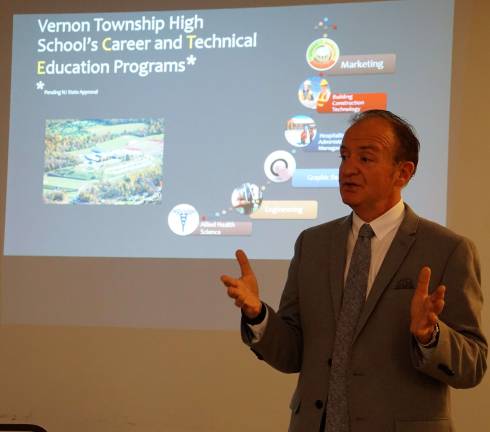Vernon school head talks career programs

VERNON — The Vernon Township School District Assistant Superintendent Charles McKay reviewed the new high school Career and Technical Education Programs with business members at the Vernon Chamber of Commerce meeting.
McKay explained said CTE can help students earn college credits while in high school, fast track them into employment, and save thousands of dollars in college tuition or certification fees.
Each program has: a three course curriculum, expert teachers in the field, and an after school club. Upon completing the three courses and passing a test, students are guaranteed a CTE certificate and college course credits with partnership universities and/or Sussex County Community College (SCCC).
In addition, McKay said, the CTE allows local businesses to provide internships and job shadowing opportunities to high school students.
The six major CTE programs are: Allied Health Science, Engineering, Graphic Design, Hospitality Administration Management, Building Construction Technology, and Marketing. The state says the six majors lead to available jobs in N.J.
Even Rutgers, McKay explained, now costs about $30,000 per year for students staying on campus. He continued, as a result of many agreements with schools, like Rutgers, parents could save the cost of a semester in college, around $15,000. Plus, all Rutgers college credits transfer to all N.J. state universities.
Each CTE course cost — to be paid by parents — ranges from $150 to $300 in comparison to $1,500 to $3,000 in college. A grant, secured last January covers the Allied Health and Hospitality CTE programs' course costs.
McKay added, the district offers “concurrency nights” to explain the program and benefits.
He also said, the district has gone from giving college credit for seven-to-ten high school classes, to now giving college credit to around 45 high school classes.
In the past, McKay said, 40 percent of students went to four year schools. Now, in addition to preparing liberal arts four year school students, the school system is focusing more on the 40 percent of students who go to two year schools — of which 80 to 90 percent go to SCCC — and the 10-20 percent undeclared or military.
McKay said if students take advantage of the programs, they could have one to 1 1/2 years community college completed before graduating from high school.
Next year, McKay said, they hope to introduce two new programs: Pre-Law and Logistics.
In addition, the high school began a Cosmetology Lab with twenty chairs, taught by a SCCC teacher. Right now, he said, they have a waiting list, and some of the students will take the certification test this spring.
McKay further explained, the high school is a satellite site for SCCC offering 22 college classes at night. Thus, it opens the way for non-traditional students pursuing second career areas like: cosmetology, music, electronics, and history.
During discussion afterwards, it was pointed out good school systems attract people to an area and make homes more valuable.
McKay concluded, it is a 21st century education, where students can be both academic and also explore possible career paths through majors. As a result, he said, “The school system is building; Walnut Ridge is packed; and we're on the rebound.”